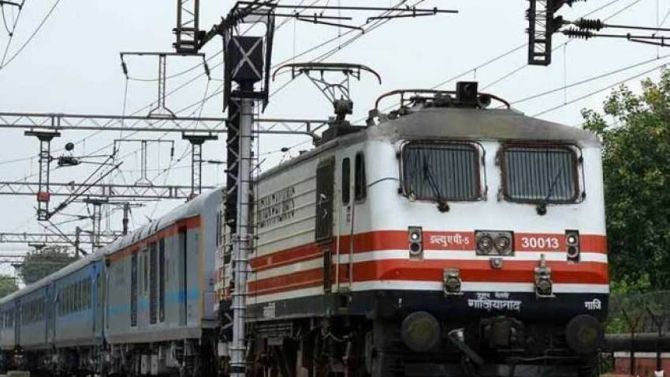Robots are now being used increasingly in the integrated-shell assembly line and robotic bogie-fabrication line. The unit may soon see its phase-II expansion, which will increase its capacity to 2,000 coaches.

In 2018-19, when Modern Coach Factory (MCF) at Raebareli manufactured about 1,500 rail coaches against a capacity of a mere 1,000, it surprised many.
Apart from its human workforce, 44 robots are also being credited for this stupendous success.
Robots are now being used increasingly in the integrated-shell assembly line and robotic bogie-fabrication line.
This is part of the plans of MCF and its design consultant, Ircon, to transform the Raebareli unit into the world's largest coach factory.
The Railway Board also wants it to make at least 5,000 coaches annually.
The unit may soon see its phase-II expansion, which will increase its capacity to 2,000 coaches.
“In the Railway Coach Factory at Kapurthala, we have a staff of 7,000.
"The introduction of robots by Ircon has helped bring this number down to 2,000 in Raebareli. From welding to cutting to assembling, robots are used in all major activities,” said S K Chaudhary, chairman and managing director, Ircon.
With the existing capacity, MCF has set a target of building 1,800 coaches in the current financial year (FY19).
These machines were earlier imported from South Korea, Spain, and Germany.
Where are robots used in Raebareli?
The factory has an integrated-shell assembly line, with a very high level of robotic application (consisting of 36 robots).
According to Ircon, this unit delivers a minimum of two coaches in a shift of six hours to meet the production requirement.
Similarly, the Robotic Bogie Fabrication Line uses eight robots and automatic handling of components to deliver four bogies in a shift of six hours each.
In addition to this, the Raebareli unit has an automated wheel-and-axle assembly line to produce one wheel set, assembled every 18 minutes.
“All these are world-class” said Chaudhary.
Now, the Railway Board is considering introducing robotic technology to other manufacturing units as well.
Ircon, which has requested the Railways to allot the MCF phase-II expansion project to it, said the average welding time of each part drops nearly 70 per cent with robotic welding in comparison to manual welding.
Robots can be used for multiple tasks and they guarantee superior quality than manual wielding.
“As a work piece is replaced on one side, the robot welds on the other, and vice-versa.
"The operator simply replaces finished product with the component to be welded next.
"In doing so, the robot is always kept in motion saving nearly 80 per cent of the time needed,” said a senior MCF official.
Road ahead for Raebareli
Chaudhary said the unit will be able to make aluminium coaches and even coaches for the Vande Bharat express which would be of export quality.
“Sri Lanka and Bangladesh are always in need of coaches. Hence, expansion of the unit will help us in getting bulk orders from abroad,” he added.
MCF will be manufacturing bullet train coaches too.
Based on its production plan, at least 240 mainline electric multiple unit (Memu) coaches will be made in FY20 and 264 each in FY21 and FY22.
Photograph: PTI Photo












 © 2025
© 2025